A wave of agricultural machines and digital applications for farmers is swelling in Sub-Saharan Africa. This innovation, spilling from the continent’s universities and start-ups, has the potential to improve yields and increase incomes. At the crest, the Resilient Africa Network supports research, invention and business with assistance and grants from its Resilience Innovation Fund. RAN is a partnership of 18 African universities in 13 countries led by Makerere University in Kampala, Uganda, and funded by the US Agency for International Development (see RAN’s latest report on its grantees here). These are a few of the farm machines and digital tools in RAN’s orbit plus three others in Sub-Saharan Africa.
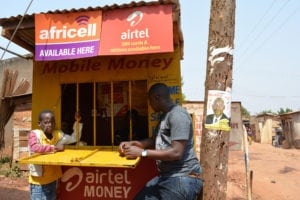
Mobile money transaction at agent’s office in Uganda Picture credit: Fiona Graham / WorldRemit / Flickr (CC BY-SA 2.0)
Angels Agric Fund (Agrifund)
Life outside of the city is sometimes a life without records, including credit history. Small-plot and impoverished farmers can find it difficult to secure financial services, but Angels Agric Fund in Uganda uses mobile tools to meet their needs. Agrifund developed a digital banking and credit platform called Akellobanker that connects rural financial service providers to the rural poor, especially farmers. The platform integrates with mobile money and text messages – SMS and USSD – to allow farmers to perform monetary transactions such as check their balances and make payments, withdrawals and deposits using their mobile phones.
Agrifund builds a credit history for farmers that blends financial data such as bill payment histories with non-financial records from telecoms to generate a credit score. The service then offers digital loans to clients based on their credit scores.
Earthly Energy
Earthly Energy, a company that provides design, engineering and manufacturing services in Uganda, developed a mechanical maize thresher. The thresher is designed to reduce post-harvest losses and increase yields and income for farmers.
RootIO
RootIO is a network of small solar-powered community radio stations in northern Uganda. The stations are supported with RootIO’s Radio as a Service cloud-based services that allow the owners to send phone calls straight to the air for broadcast, download audio from the Internet and poll listeners who vote with text messages. Using their mobile phones, radio show hosts can interact with callers on the air, businesses can record advertisements and journalists can record meetings, sports and other events for broadcast. The stations serve as a platform for farmers and other rural residents to share knowledge and views among one another, and as an emergency warning and information service.
Low-Cost Solar Irrigation Pump
To the semi-arid regions of Eastern Africa, water is one of the most powerful and yet scarce resources that is needed for agricultural activities. The costs of irrigation pumps currently on the market are prohibitive. The cheapest pumps available from leading pump manufactures cost a minimum of USD $500, which is costly to many rural communities in Africa. Moreover, cheap pumps are often powered by kerosene, further driving up the cost of running them.
The Low-Cost Irrigation Project incubated at RAN is designed to help small-holder farmers pump water from the source to their crops, ensuring that they will grow and give good yields even when there is inadequate rain. The solar pump is estimated to cost $100 will be affordable by most farmers or groups who can recover the investment in less than one year.
The Impact
The Low Cost irrigation Project started in 2011 and has been piloted and showcased to more 100 farmers. The project is in the process of setting up a small-scale manufacturing facility to scale up production. The project is also negotiating with the Ugandan government’s Operation Create Wealth Program to supply up to 10,000 solar water pumps to boost farming by small-holder farmers to enable them to eradicate poverty from the rural areas. The project will cooperate with other organizations such as farmers groups, health centers and animal farmers who need to establish water supplies. The solar pump has helped farmers to harvest three times as much as they did without it, and it allows for continuous, year-long farming through irrigation.
Kungula Maize Thresher and Winnower
Grassroots research paint a gloomy picture of Uganda’s food security. High on the list of causative factors is poor post-harvest handling, where most farmers incur losses, cumulatively leading to loss of billions of shillings during harvest. In most districts, the average weight loss as a result of poor post-harvest handling is 30,000 metric tons of maize, worth over Shs 13billion. Maize is one of the core food and cash crops in sub-Saharan Africa, but due to little or no access to technologies to enable its efficient processing, maize production is low compared to what is needed on the market. To make matters worse, farmers still use indigenous methods of threshing and winnowing maize during the post-harvest processes. Their work is labor intensive and wastes time. Their methods also promote greater risks of problems such as contamination from soil particles, broken cobs, and broken maize grains, thus loosing nutritious parts of a substantial portion of the seed.
The Innovation: Kungula
Kungula is an optimized, low-cost technology for post-harvest handling through the mechanized threshing and winnowing of maize. The solution includes a mechanized thresher targeting large-scale growers and a low-cost manual thresher for small-scale farmers. This thresher differs from other existing machines on the market because it incorporates a centrifugal winnowing fan that protects maize grain from external contaminants, releasing out chaff and dust.
The improved output efficiency has led to shorter farm-to-market turn-around-time. To date, innovators have engaged approximately 100 farmers. The estimated unit cost of this device is $150, which farmers can purchase as individuals or in farmer groups. The Innovators have started selling machines to groups of farmers.
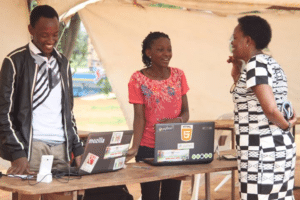
Isaac Omiat (L) and Lisa Katusiime of the Agro Market Day team chat with a judge at National Youth Inventors and Innovators.
Agro Market Day
This mobile phone application enables farmers to sell their produce, get information about agricultural markets and market days, shares modern farming methods and tips on agricultural tools for tailored to districts in Uganda. The app in now in Google Play for download.
M-Omulimisa
M-omulimisa disseminates farming information and solutions to Ugandan smallholder farmers in local languages via mobile phones. The project does the following;
- Connects farmers with local agricultural extension officers via SMS services and an online database
- Generates and shares contextualized solutions in understandable languages
- Predicts the spread of contagious disease among crops and livestock in real time
- Engages Ugandan youth in the sector of agriculture

iCow
Livestock farmers in Kenya use iCow to learn best practices for rearing their cows and chickens, and to track the animals’ gestational periods and find the nearest veterinarian. Created by Green Dreams and distributed through Safaricom, Kenya’s largest mobile service provider, iCow sends weekly SMS messages with tips on breeding, diet, nutrition, health, illness, milk production and other information.
To track gestational periods, farmers register their cows and their insemination date by SMS short code, and then receive periodic SMS prompts on when to take action during the gestation period.
[From 10 mThings Changing Lives in Developing Countries]

Esoko
Esoko allows its users to push information to small-holder farmers with the goal of improving their income. Updates include market prices, weather forecasts, advisory services and others. The system can also survey farmers to understand their needs and gives them the option of setting up a Web site.
The system operates in multiple currencies, targets multiple commodities and markets and has developed projects in 16 sub-Saharan African countries and Mexico.
[From 10 mThings Changing Lives in Developing Countries]

WeFarm
This free-of-charge, peer-to-peer platform allows smallholder farmers to share information among themselves. WeFarm users can ask and answer questions and share tips about farming and business through SMS messages or online, meaning that it works with or without Internet access.
WeFarm is built around the principle that rural farming communities in developing countries have generations worth of knowledge to share but lack the tools to do so.
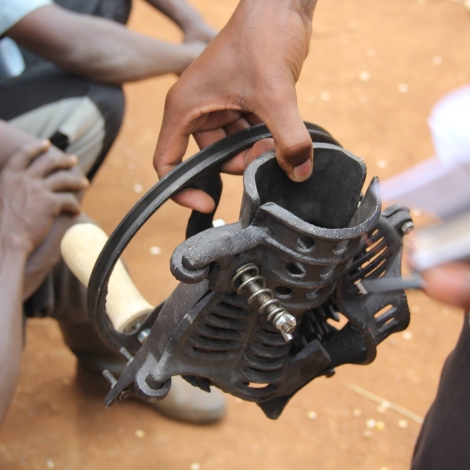
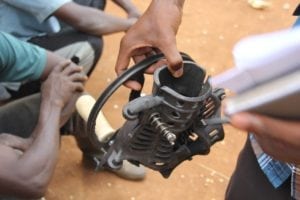
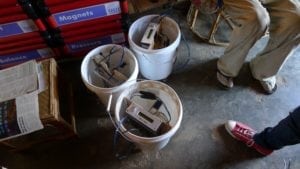
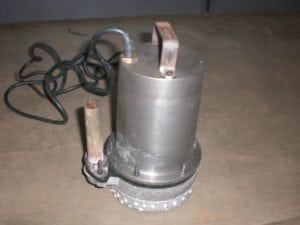
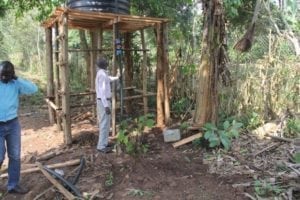
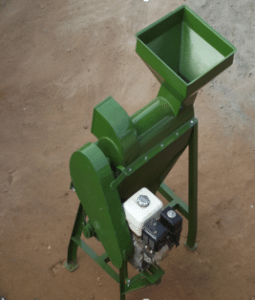
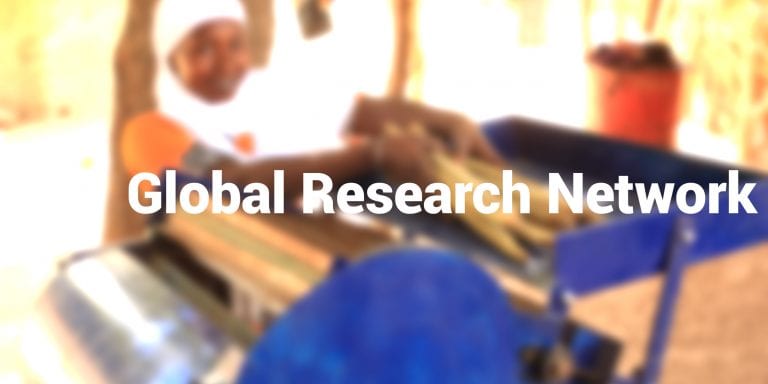
I think this is a great thread that needs to be fleshed out much more. In last 10 years or more more there has been a minor revolution in development of scale appropriate and affordable ag and rural based capital goods AND their . spread. Machinery like the small scale, affordable machinery like mini-tillers, battery powered three-wheelers (0.8 to 1.6 kw), maize shellers, micro mills etc. that have and are spreading very quickly in S Asia and elsewhere, many times without wasteful gvt subsidy..ie pvt sector led. Many machines are of simple designs that can be copied and fabricated or partially fabricated locally. Also there is the continued spread and even up tick in sales of older established-old school “appropriate” technologies like 2-wheel tractors (aka power tillers- in the millions ), threshers, reaper harvesters, and even mid-small size combine harvesters. HESN/Innovation labs may prove their worth in the future but what is lacking is for the US and other academies to look around in the developing world at what is succeeding already, and attempt to bring and test / test market those techs and ideas with appropriate pvt sector partners to where they ain’t.
That’s an important point, thanks for making it.